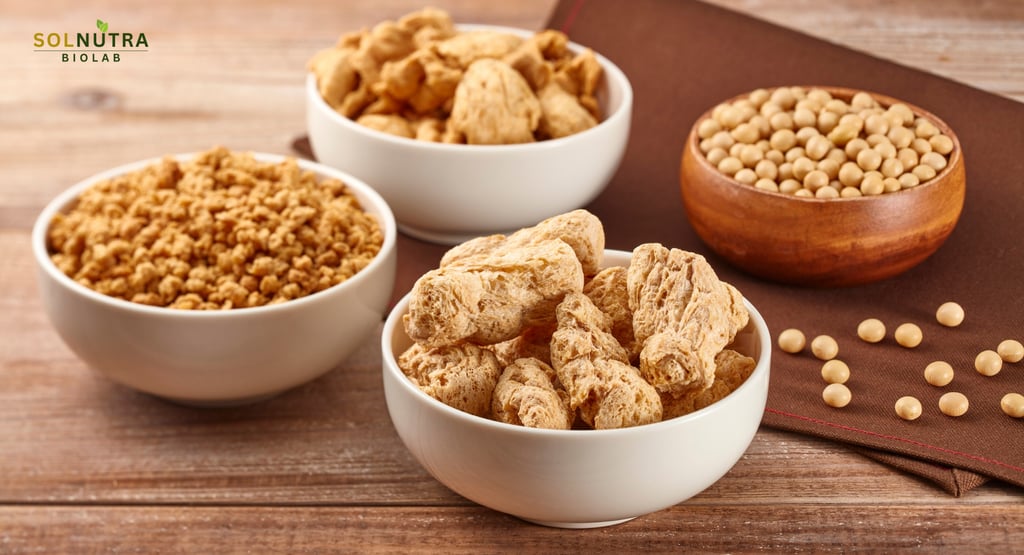Plant-Based Protein Powders: Beyond Whey
4 min read


Introduction to Plant-Based Proteins
In recent years, there has been a significant surge in the popularity of plant-based protein powders, which serve as a viable alternative to traditional whey protein, particularly among vegans and vegetarians. This shift can be attributed to a growing awareness of the health benefits associated with plant-based nutrition, as well as increased accessibility to high-quality plant proteins. With a focus on sustainability and ethical dietary choices, consumers are actively seeking alternatives that align with their values, thereby paving the way for a robust market for plant-based proteins.
Protein plays a crucial role in muscle recovery, growth, and overall health, making it an essential component of any balanced diet. While animal-derived proteins have long dominated the landscape, research indicates that plant-based proteins can provide comparable benefits. In fact, some studies have suggested that certain plant proteins may confer additional health advantages, such as improved digestion and enhanced nutrient density. As a result, athletes, fitness enthusiasts, and health-conscious consumers are increasingly recognizing the value of integrating plant-based protein powders into their dietary regimens.
Further driving this trend is the consumer demand for organic and clean-label products, which emphasize transparency in ingredient sourcing and manufacturing processes. Brands that prioritize these values, such as Solnutra, are well positioned to meet the evolving preferences of health-conscious individuals. Solnutra’s offerings not only cater to the desire for high-quality, non-GMO sources but also reflect a commitment to sustainability and environmental responsibility. As the market continues to expand, it will be essential to explore the various types of plant-based proteins, including pea, hemp, and soy, to provide insight into their unique properties and benefits.
Comparative Analysis of Pea, Hemp, and Soy Proteins
In the realm of plant-based protein powders, pea, hemp, and soy proteins stand out as popular alternatives to traditional whey protein. Each of these sources comes with distinct amino acid profiles and varying levels of digestibility, making them suitable for different dietary needs and preferences.
Pea protein, derived from yellow split peas, contains a well-balanced amino acid profile but is notably lower in methionine compared to other protein sources. It is rich in essential amino acids such as lysine and arginine, making it particularly appealing for individuals looking to build muscle mass or support overall recovery. The digestibility of pea protein is characterized by its high Protein Digestibility-Corrected Amino Acid Score (PDCAAS) of around 0.76, which indicates a good absorption rate. This makes it a suitable choice for those with sensitivities to dairy or gluten.
Hemp protein, sourced from hemp seeds, contains a different set of amino acids and has the distinction of being an excellent source of omega-3 fatty acids. With a PDCAAS score of approximately 0.46, it is less digestible than the other two options, but it provides a complete protein source due to its favorable amino acid profile. While hemp protein includes essential amino acids, its lower levels of lysine may limit its efficacy for muscle repair compared to pea or soy protein powders.
Soy protein, extracted from soybeans, boasts one of the most complete amino acid profiles, rivaling animal proteins. Its PDCAAS score is an impressive 0.92, making it highly digestible and easily utilized by the body. Rich in leucine, an important amino acid for muscle synthesis, soy protein serves as a valuable option for those seeking to enhance their protein intake without animal products. However, some individuals may avoid soy due to concerns about allergies or phytoestrogens.
Each of these plant-based protein powders presents unique benefits and limitations depending on individual dietary needs and preferences. Therefore, understanding their amino acid profiles and digestibility is crucial in making an informed choice for one’s specific nutritional goals.
Solnutra's Commitment to Quality: Organic, Non-GMO Canadian Plant Proteins
Solnutra is dedicated to providing superior organic, non-GMO plant proteins sourced exclusively from Canada. Understanding the growing demand for clean-label products, Solnutra ensures that every protein powder adheres to stringent quality standards, emphasizing the importance of natural ingredients and sustainable practices. This commitment begins with sourcing, where Canadian farmers are selected based on their ethical farming practices and their adherence to organic farming regulations.
The production processes employed by Solnutra systematically eliminate any artificial additives and preservatives. From seed to shelf, the company prioritizes transparency and integrity, ensuring that consumers can trust the ingredients they consume are free from harmful chemicals. By utilizing methods that maintain the protein's natural integrity, Solnutra’s plant proteins are not only pure but also highly nutritious.
Opting for Solnutra's plant-based protein powders can have a positive impact on personal health. The absence of genetically modified organisms (GMOs) means users can be confident about what they are putting into their bodies. With a focus on blending various plant sources, Solnutra captures a comprehensive profile of essential amino acids vital for muscle recovery and overall health. Moreover, these products are tailored to fit various dietary needs, appealing to both vegans and those looking to reduce animal protein intake.
Solnutra's environmental responsibility further sets it apart from other brands. Choosing organic, non-GMO Canadian proteins helps reduce the carbon footprint associated with heavy agriculture practices. The focus on sustainable farming not only enhances soil health but also promotes biodiversity, contributing to a healthier ecosystem. By opting for Solnutra, consumers support a brand that values ethical sourcing and environmental stewardship, paving the way for a healthier planet.
Conclusion and Call to Action
In examining the varying benefits of plant-based protein powders such as pea, hemp, and soy, it becomes evident that each option presents unique nutritional advantages tailored to different dietary needs. Pea protein, derived from yellow split peas, is favored for its high protein content and excellent digestibility, making it an ideal option for those avoiding common allergens. Hemp protein, on the other hand, stands out due to its rich content of omega fatty acids and dietary fiber, supporting overall health and enhancing heart function. Lastly, soy protein is recognized for its complete amino acid profile, contributing significantly to muscle repair and growth, essential for active lifestyles.
Choosing the right protein source ultimately hinges on individual nutritional goals and dietary restrictions. For instance, athletes might lean towards soy for its complete protein nature, while those seeking a plant-based diet without allergens might prefer pea or hemp. The diverse array of options available within the realm of plant-based protein powders also highlights the increasing recognition of plant-derived nutrients as valuable components in modern diets.
As the demand for plant proteins continues to rise, it is crucial for consumers to consider the nutritional composition, flavor, and suitability of each option according to their personal health objectives. Ultimately, the shift towards plant-based proteins not only promotes environmental sustainability but also encourages healthier eating practices. To better understand which protein aligns best with your dietary needs, we invite you to experience the quality and benefits of Solnutra’s diverse plant protein line. Request a sample today and take the first step towards enhancing your wellness journey with high-quality plant-based nutrition.
